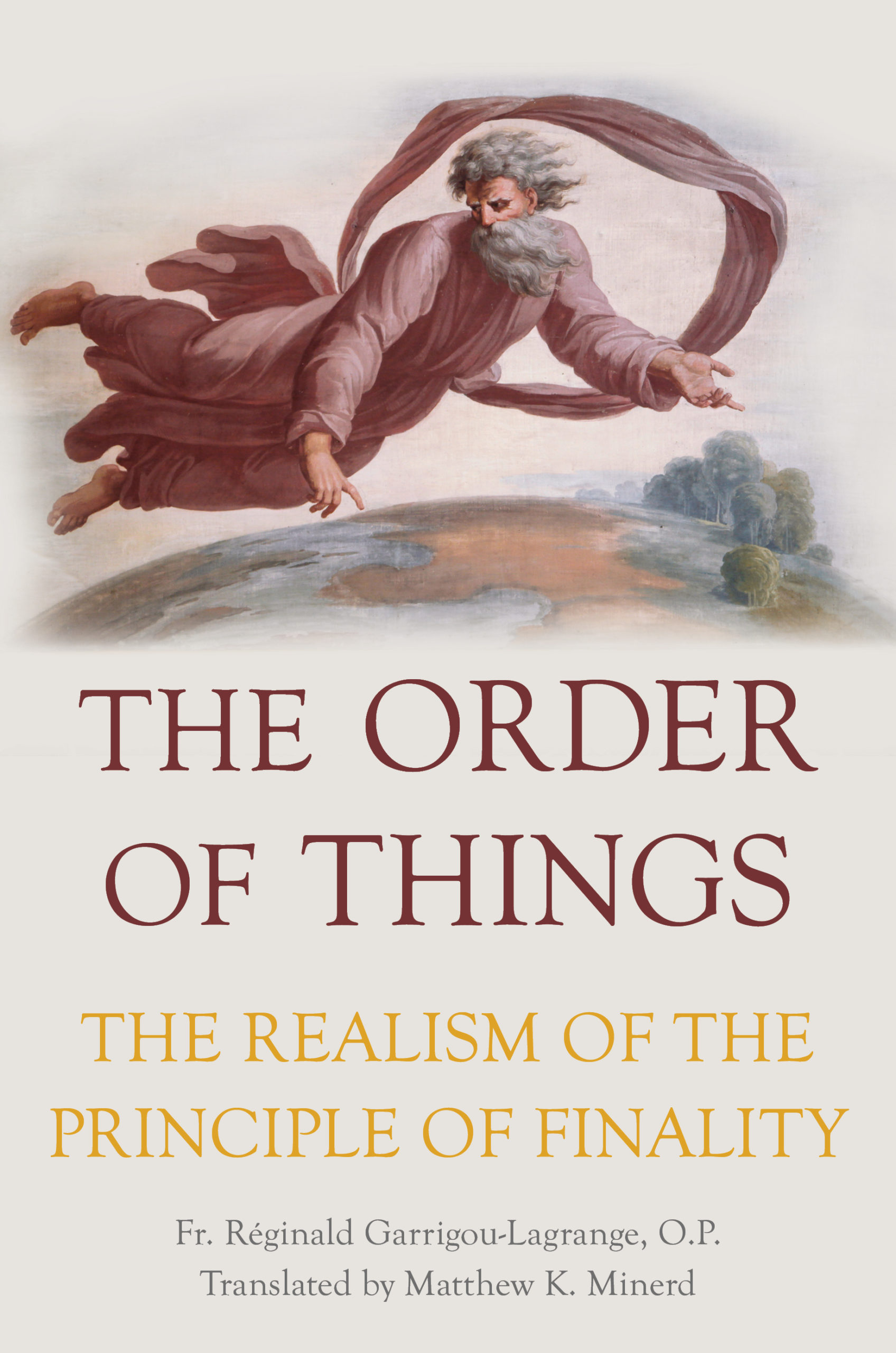The Order of Things: The Realism of the Principle of Finality is an exploration of the metaphysical principle, “Every agent acts for an end.”
In the first part, Fr. Garrigou-Lagrange sets forth the basics of the Aristotelian metaphysics of teleology, defending its place as a central point of metaphysics. After defending its per se nota character, he summarizes a number of main corollaries to the principle, primarily within the perspective established by traditional Thomistic accounts of metaphysics, doing so in a way that is pedagogically sensitive yet speculatively profound.
In the second half of The Order of Things, Garrigou-Lagrange gathers together a number of articles which he had written, each having some connection with themes concerning teleology. Thematically, the texts consider the finality and teleology of the human intellect and will, along with the way that the principle of finality sheds light on certain problems associated with the distinction between faith and reason. Finally, the text ends with an important essay on the principle of the mutual interdependence of causes, causae ad invicem sunt causae, sed in diverso genere.
Réginald Marie Garrigou-Lagrange, O.P. (1877–1964), was a French Catholic theologian and leading Thomist of the twentieth century who taught at the Dominican Pontifical University of St. Thomas Aquinas, the Angelicum, in Rome from 1909 to 1960.
Matthew K. Minerd, Ph.D. is a Ruthenian Catholic, husband, and father, serving as a professor of philosophy and moral theology at the Byzantine Catholic Seminary of Saints Cyril and Methodius in Pittsburgh, PA. He has been published in Nova et Vetera, The American Catholic Philosophical Quarterly, The Review of Metaphysics, Études Maritainiennes, Downside Review, and Homiletic and Pastoral Review. He has also served as a translator or editor for volumes published by Emmaus Academic, Cluny Media, and The Catholic University of America Press.
“Being and finality—these principles account for all of reality. Nothing is without them. Nothing makes sense without them. And this is why The Order of Things is so important: it introduces readers to the dynamics of real being. In this book, Father Garrigou-Lagrange teaches his readers how to think. Dr. Minerd’s editorial notes reveal that he is not only a faithful translator of Garrigou’s words but also an insightful expositor of Garrigou’s thought. Thus, we rejoice in the fact that this ‘handbook of wisdom’ is once again available to a world that continues to search—rather desperately—for the order of things.”
—Cajetan Cuddy, O.P.
Dominican House of Studies
“Maritain described the conditions in which Garrigou-Lagrange wrote this work to Yves Simon as laboring ‘without a secretary, crushed by courses to teach, in the Collegio Angelico in isolation from everyone, facing exhausting work all alone,’ saying further, ‘If we have understood something regarding Thomism, it is thanks to him. . .’ In The Order of Things, Garrigou-Lagrange brought forth an uneven but illuminative and profound work, powerfully communicating the insights of the philosophia perennis. Matthew Minerd performs a very great service in rendering this work available to English readers. Those who see that scientia is not merely a source but a habitus will feel renewed gratitude to the old Dominican Master and to his insightful translator.”
—Steven A. Long
Ave Maria University
“An English translation of this neglected work of Garrigou-Lagrange’s is long overdue. We are in Matthew Minerd’s debt for bringing it off at last. The availability of Le réalisme du principe de finalité to English-speaking audiences is sure to further the current revival of interest in Scholastic thought and Aristotelian philosophy.”
—Edward Feser
Pasadena City College
“This book should shed light on Thomas’s understanding of the final cause even for those who are skeptical about Garrigou-Lagrange’s approach to metaphysics. Furthermore, I know of no better instance of how a Thomist might argue for the existence of God on the basis of the natural desire for happiness.”
—Thomas M. Osborne Jr.
University of St. Thomas



Nicholas Ramirez –
Fr. Reginald Garrigou-Lagrange is an excellent expositor of the principle of finality (that every agent acts for an end) in Aristotle and Aquinas’ thought, as well as the principle’s forgotten relevance in the disciplines of philosophy and theology.
For the philosopher, Lagrange demonstrates how foundational the principle of finality is for both metaphysics and epistemology. With respect to the latter, Lagrange brilliantly explains the problematic beginnings of Cartesian philosophy with the cogito ergo sum, recognizing that this presupposes the more fundamental Aristotelian distinction between being and non-being, and act and potency. This allows the individual to escape the solipsistic trap of Cartesianism and ground the first principles of philosophy not exclusively in the mind, but in the nature of reality itself. With respect to the former, Lagrange argues against the rejection of the principle of finality posed by modern philosophers such as David Hume. The principle of finality is intrinsically tied to the other foundational principles of philosophy like the principle of identity/contradiction, and the principle of raison d’être. These principles, along with any basic understanding of metaphysics, fall apart without the principle of finality.
For the theologian, Lagrange demonstrates the importance of the principle for understanding the intellect and the will. This takes up the second half of the book. In so doing, Lagrange addresses several issues including how the intellect, ordered to knowledge of universals, is able to know particulars as well. However, Lagrange also provides a delightful demonstration of the existence of God from the will’s ordering to the universal good and man’s natural desire for happiness. Lagrange concludes this section with the importance of the principle of the mutual influence of causes (with respect to the four causes) and its necessity for both philosophy and theology, and how it is found not only in nature and in the spirit of man, but also in God’s grace and Goodness.
Lastly, Dr. Minerd’s translation is brilliant and clear. His footnotes demonstrate not only his prowess as a translator, but his comprehensive understanding of the speculative principles in Lagrange’s thought and the historical context in which he was writing. The reader will find his translator’s notes in the footnotes to be supremely useful, especially for references to other works which can provide more clarity on certain topics. I look forward to reading many more of Dr. Minerd’s translations of Fr. Garrigou-Lagrange’s other works.
Charles Schmidt –
The Order of Things by the Dominican priest Reginald Garrigou-Lagrange is an outstanding work of philosophy. The main theme of the book is that the principle of Finality – i.e. every agent acts for an end – is a foundational principle of reality, and the author proves it.
There are many superb, profound truths that are pointed out, including:
All men by nature seek to know and love the truth and, above all, to know God, who is the Supreme Truth, and to love Him above all things and to serve Him. There is order in nature and things in nature are ordered to ends. The eyes is made for seeing; the ear is made for hearing. That finality in nature comes from an ordering intelligence. Otherwise, you explain order by disorder, what is most beautiful and lofty in nature by that which is lowliest – by chance.
St. Thomas vigorously insisted upon this subordinate of agents and ends. According to him, every creature, by the very fact that it is necessarily subordinated to God, is naturally inclined to love God, its author, more than it loves itself. It is more of Him and for Him that it is of itself and for itself, just as the part exists more for the whole than for itself. Just as the hand sacrifices itself in order to save the body, above all to save the head, so too does the stone tend toward the center of the earth for the cohesion and good of the universe, and so too does the hen sacrifice herself for her chicks for the good of the species, which is a manifestation of the goodness of the Creator. [Everything and everyone is naturally inclined to love God more than it loves itself.]
Scientific knowledge provides only limited happiness. Scientific knowledge is a very limited good. Truth, even if it is complete and unmixed with error, is the good of the intellect, but not the good of the whole man. Besides the intellect, the heart and the will also have their profound spiritual needs, and if they are not satisfied, we will have no true happiness. [Knowledge provides truth, but men also need goodness and beauty.]
Finality (i.e., purpose) is an intrinsic constitution of being. [To know human nature, one needs to know man’s purpose, which is to know, love and serve God. Man’s purpose is to know and do the good, the beautiful and the true.]
It is impossible for man’s true happiness to be found in any created good, for true happiness is a perfect good that completely brings the appetite to rest. Otherwise, it would not be the final end if something still remained to be desired. Now, the object of the will, which is the human appetite, is the good in its universal form, just as the object of the intellect is the truth in its universal form. Hence, it is clear that only the universal good can bring man’s will to rest; and the universal good is not found in any created thing but, rather, is found in God alone because every creature only has goodness by participation. Whence, only God can satisfy man’s will. Therefore, man’s true happiness is fixed solely in God.
As can be seen from the above excerpts, The Order of Things is an outstanding book of wisdom that should be studied carefully and cherished, as should all wisdom.